Giorgio Cafiero analyzes the chances of Riyadh deciding to re-embrace Syria’s president and invest in the country’s reconstruction.
By Giorgio Cafiero
Special to Consortium News
 In March 2019, Saudi Arabia’s Minister of Foreign Affairs Adel Al-Jubeir declared that it was then too early to restore the kingdom’s diplomatic relations with Syrian President Bashar al-Assad’s government. Nearly one year later, however, experts claim that the thinking in Riyadh has changed and some think Riyadh is likely to restore diplomatic relations.
In March 2019, Saudi Arabia’s Minister of Foreign Affairs Adel Al-Jubeir declared that it was then too early to restore the kingdom’s diplomatic relations with Syrian President Bashar al-Assad’s government. Nearly one year later, however, experts claim that the thinking in Riyadh has changed and some think Riyadh is likely to restore diplomatic relations.
Last month, a pro-Assad Syrian newspaper reported on a recent meeting between Damascus’ permanent representative to the United Nations and Saudi diplomats who “expressed their belief that what has happened between the two countries should pass, stressing on the brotherly relations that have long brought Syria and Saudi Arabia together.”
In coordination (and at times competition) with Qatar, Turkey and the United States, the Saudi kingdom was one of the key state sponsors of the anti-Assad rebellion that erupted in 2011. But in 2015, Riyadh gave up on its vision for a Sunni-dominated post-Ba’athist Syria, at least in the foreseeable future. This was mainly due to the intensified Russian military intervention, which unquestionably helped turn the tide in Assad’s favor.
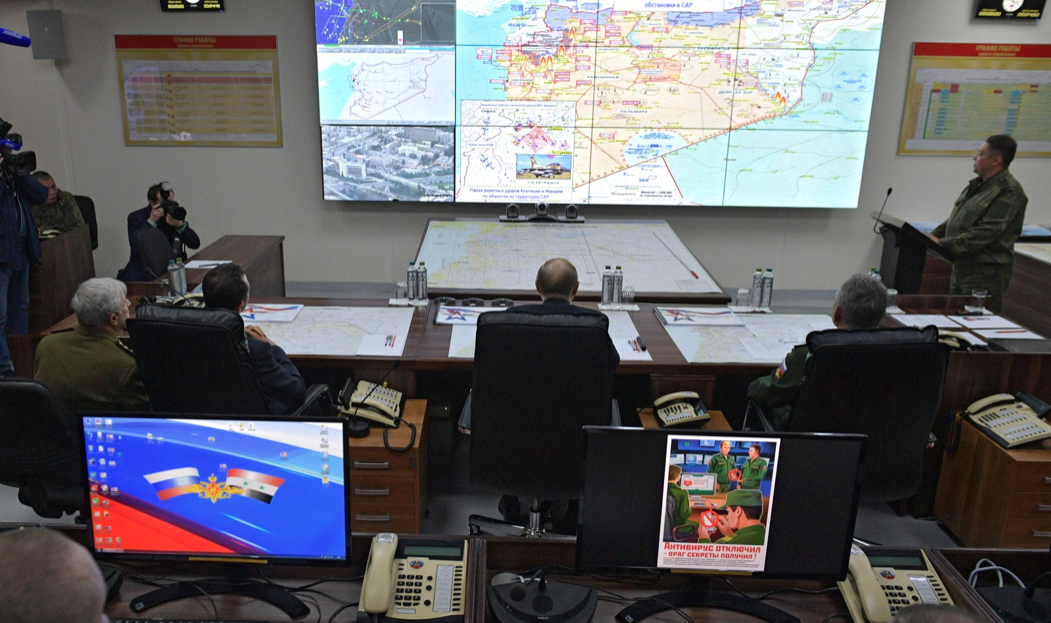
Russian President Vladimir Putin visited command post of Russian Armed Forces in Syria, January 2020, to hear military reports on the situation in various regions of the country. (Kremilin)
Riyadh Addresses Russian Interests
Although Moscow’s bold moves in defense of Syria’s regime angered many in Saudi Arabia and other Gulf Cooperation Council (GCC) member-states, officials in Riyadh begrudgingly accepted Russian achievements on the ground. The new understanding was that with the Kremlin determined to prop up Damascus the fall of Assad was extremely unlikely.
At the same time, the kingdom’s leadership has lost confidence in the United States as an ally willing to defend Saudi interests, a development evident during the presidencies of both Barack Obama and Donald Trump. Like many Arab states, Saudi Arabia has tried to diversify its global alliances so it is less dependent on Washington as a security guarantor, especially as questions about the long-term U.S. agenda in the Middle East remain open.
Consequently, Riyadh has invested in its Russian partnership. Although Saudi leaders did not support Russia partnering with Iran to help Assad’s government crush a mostly-Sunni rebellion that Riyadh backed, Saudi officials noted Russia’s firmness in Syria. And Riyadh saw Russia’s commitment to its ally as a major contrast to the U.S.
While the kingdom does not agree with the Kremlin on all issues, the Saudis see Russia as being committed, disciplined and ambitious in the Middle East while Washington’s influence wanes. This gives Riyadh a pragmatic reason to pursue stronger ties with Moscow.
Without question, Saudi Arabia’s interests in better ties with Russia have led Riyadh to greater accommodation of Moscow’s role in the Middle East. The kingdom’s softened stance against Assad is a case in point.
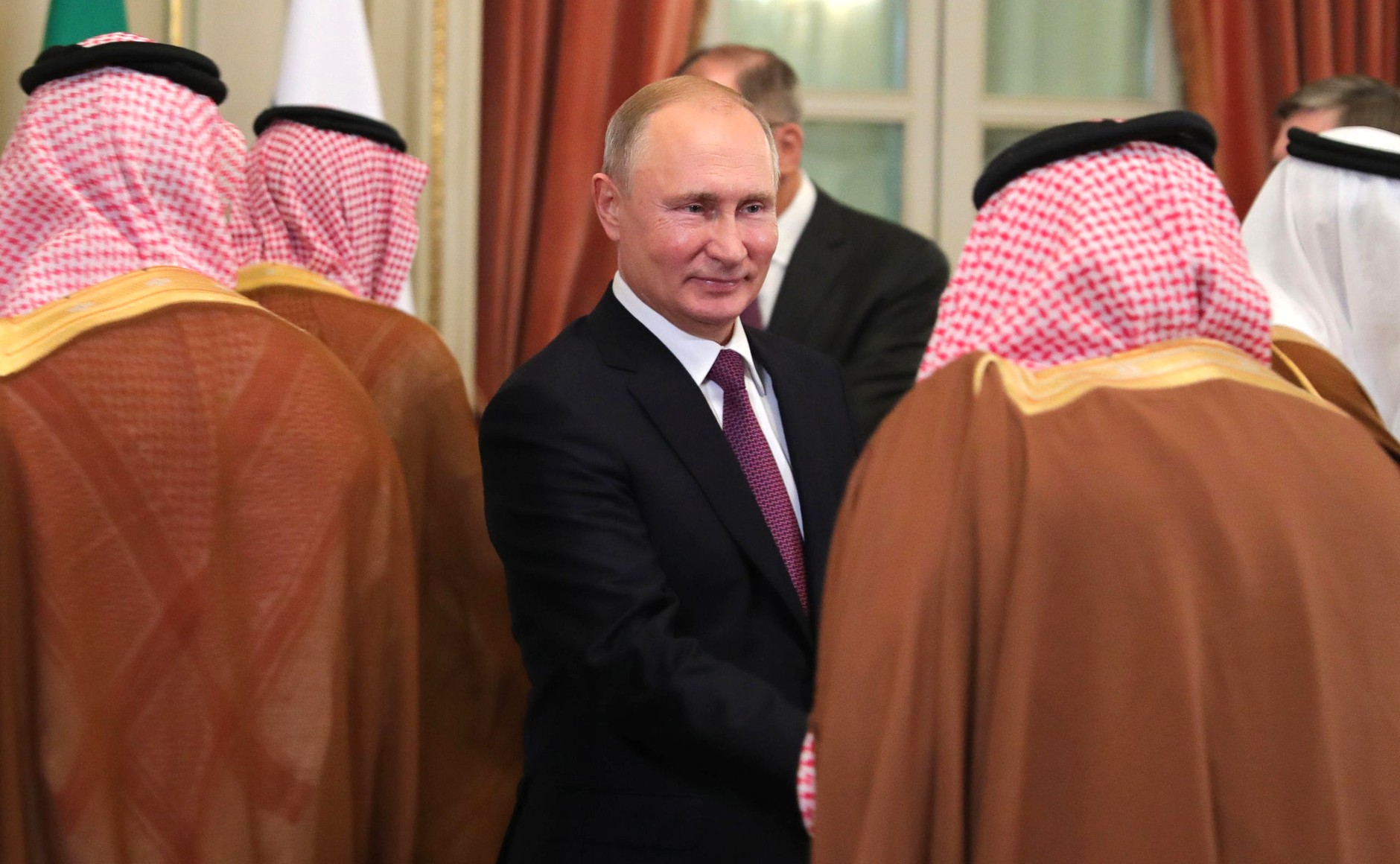
Russian President Vladimir Putin before a meeting with Saudi leaders, Dec. 1, 2018. (Kremlin)
Turkish ‘Expansionism’ into Arab Lands
Any prospect of Saudi Arabia’s government restoring high-level diplomatic relations with Damascus must consider the Turkey factor.
The negative direction of Saudi-Turkish relations in recent years, especially following the Khashoggi affair, has unfolded against the backdrop of Riyadh and some other major Sunni Arab capitals growing fearful of Ankara’s foreign policy in the Arab region. This has greatly eased the kingdom’s opposition to Syria’s Ba’athist regime since that regime — like Riyadh, Abu Dhabi and Cairo — views Turkey’s Muslim Brotherhood-friendly government as the enemy.
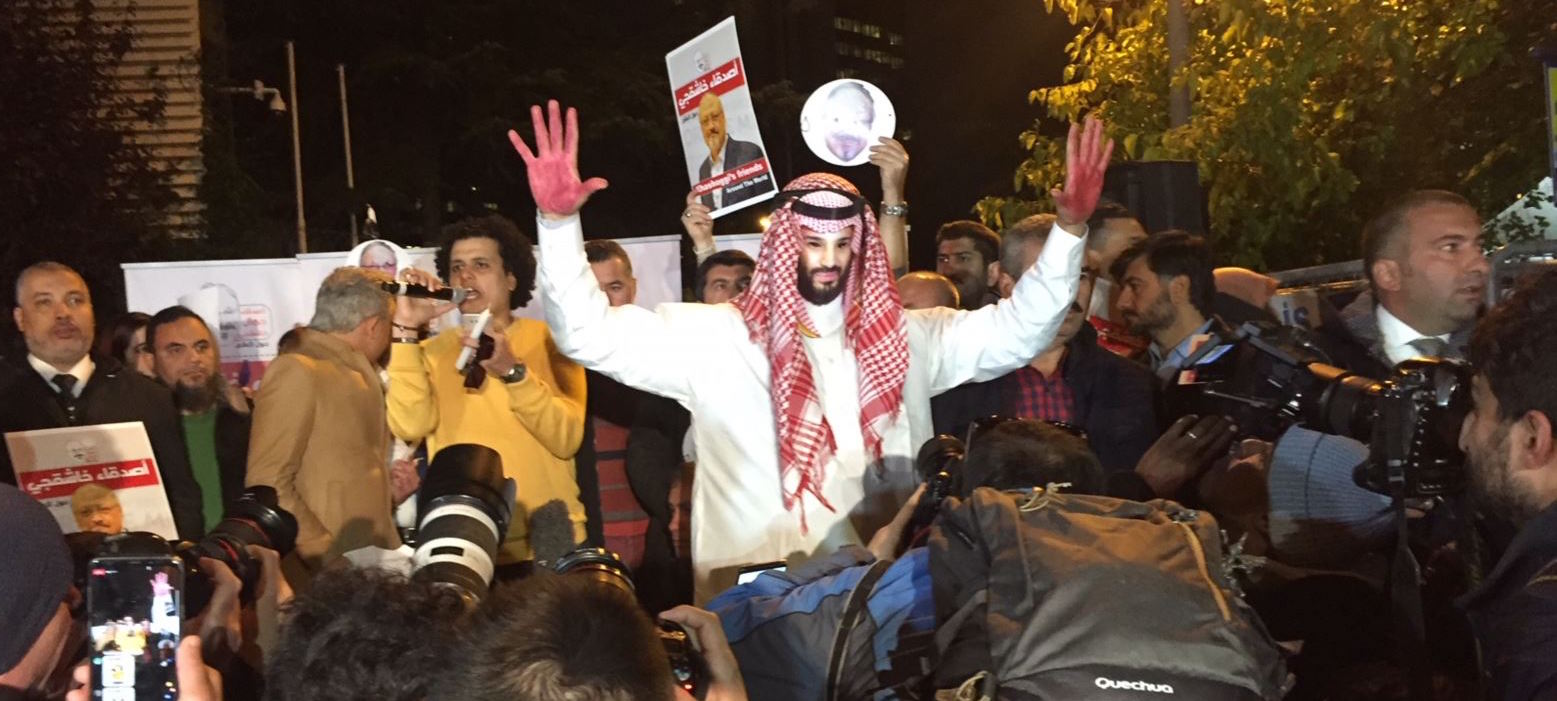
Istanbul protesters outside Consulate General of Saudi Arabia following the murder of Khashoggi. (Hilmi Hacaloglu, VOA via Wikimedia Commons)
In fact, Riyadh’s perceptions of the grave threat represented by Turkish “expansionism” or “neo-Ottomanism” into the Levant, and by extension the wider Islamic world, may prompt Saudi officials to view reconciliation with Assad’s government as absolutely necessary.
It is no exaggeration that Riyadh and Abu Dhabi now address this alleged Turkish threat as a parallel to the perceived threat from Iran. Saudi pundit Salman al-Dossary argues that Turkey’s actions in the Libyan civil war are a “clone” of Iran’s use of proxies in the Arab world. This view, which has become increasingly accepted in Riyadh and Abu Dhabi, fits into a narrative about a dual Turkish-Iranian threat that GCC members must counter with a policy of “dual containment,” as observed by Samuel Ramani.
Saudi Role in Syria’s Reconstruction?
While the Damascus regime remains a close ally of Iran, there has been a view in Riyadh that the kingdom can use its financial resources to lure Assad’s government closer to the fold of Arab states — such as Saudi Arabia, the UAE, Egypt, Bahrain, Kuwait and Jordan — and away from Tehran.
There is also a growing belief in the GCC that Russia might draw Syria closer to Moscow and further from Tehran. This is based on the potentially competing interests of Russia and Iran in “post-conflict Syria.”
However, the chances of either Russia or the Gulf states putting significant distance between Syria and Iran could be very low given the extent to which Tehran and Iranian-backed non-state actors have institutionalized their influence and consolidated power in post-2011 Syria. This is true both in terms of the war-torn country’s security architecture and its economy.
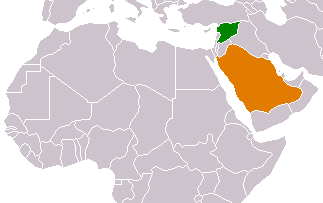
Map showing Sryia in green; Saudi Arabia in orange.
(Freedom’s Falcon, CC BY-SA 3.0, Wikimedia Commons)
This brings us to the issues of investment in Syria’s reconstruction and development stages as well as Saudi Arabia’s grander geopolitical and economic designs in the Levant and across the eastern Mediterranean.
Russia wants Syria rebuilt and for the country to stabilize with Assad’s regime governing every inch of Syrian land. Yet the Russians are not in a position to independently finance this reconstruction and Moscow is hoping for GCC states to make bold investments notwithstanding U.S. pressure to keep their money out of Syria. Nonetheless, the UAE has been discussing Emirati investment in Syria since Abu Dhabi re-established official diplomatic relations with Assad’s government in late 2018. It is possible that Saudi Arabia will soon follow the Emirati lead and re-embrace Assad as a leader.
Assad & the Sunni Arab World
There is no denying that since 2017/2018, the Assad regime has been gradually re-integrating into the Arab region’s diplomatic fold. One key blockage has been Saudi Arabia’s opposition to re-accepting the Assad government’s legitimacy. The U.S. factor is also in play and this does matter for Riyadh. Washington remains opposed to the reintegration of Assad’s government into the international community and financial markets. The U.S. has been putting pressure on Arab states to reconsider their re-engagement with Damascus.
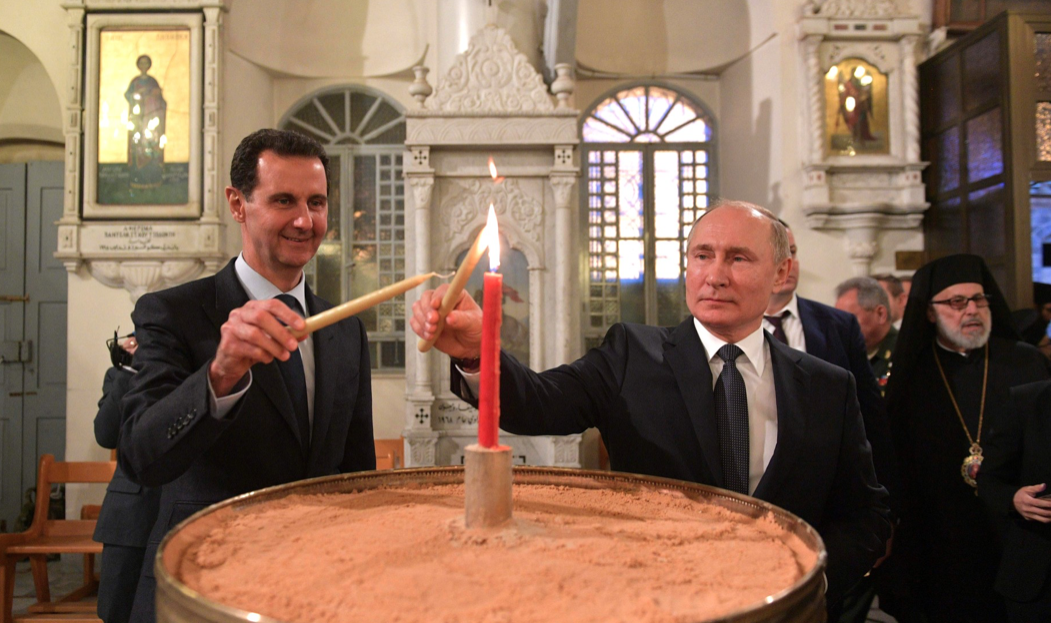
Sryian President Bashar al-Assad, left, with Russian President Vladimir Putin at
Orthodox Mariamite Cathedral of Damascus, January 2020. (Kremlin)
Looking ahead, the Al Saud may decide to restore their once warm relationship with the Assad family, even if that means raising risks of new problems in their partnership with Washington.
After years of Saudi media portraying Assad as an evil monster and after the government in Riyadh armed his enemies early in the Syrian crisis, the government in Riyadh will have to address its own citizens. Many of them, at least until 2015, were hoping for and betting on Assad falling to Saudi-backed rebels.
Selling a change to the kingdom’s domestic audience would be done through a narrative about a pan-Arab bloc working to expel Turkish “occupiers” from Syria as well as Libya. The Saudi government’s messaging would stress its view — shared by Abu Dhabi — that Turkish President Recep Tayyip Erdogan poses a greater threat to Arab interests than does Assad.
Reconciliation between the Saudi kingdom and Assad’s government would upset many in Washington. It is a safe bet that Russian President Vladimir Putin would consider it an enormous gain for Moscow’s Middle East agenda. Such a development would further highlight the extent to which the Arab region’s geopolitical landscape is becoming increasingly Russia-friendly and further adrift from the orbit of U.S. power.
Giorgio Cafiero (@GiorgioCafiero) is the CEO of Gulf State Analytics (@GulfStateAnalyt), a Washington-based geopolitical risk consultancy.
The views expressed are solely those of the author and may or may not reflect those of Consortium News.
Please Donate to Consortium News.
Before commenting please read Robert Parry’s Comment Policy. Allegations unsupported by facts, gross or misleading factual errors and ad hominem attacks, and abusive or rude language toward other commenters or our writers will not be published. If your comment does not immediately appear, please be patient as it is manually reviewed. For security reasons, please refrain from inserting links in your comments, which should not be longer than 300 words.

I repeat above; insightful and convincing, except for the lurking CIA seniors et el la in the background. However the US MIC (military industrial complex) economic policy is factually not sustainable; nuclear, missile, economically, politically, socially and above all for climate change:
As an example, pre-emptive nuclear strikes on Russia or anyone else risks world destruction, clear to those with a balanced and educated view (please feel free to challenge me on this) except the CIA and MIC schooled narrative.
The problem is in large part the comfortable lifestyle of the US MIC corporate CEOs, their ready access to power and their prominent placement among the worlds top ‘profit at any cost’ investment cabals.
I find the authors line of thinking rather weak. Money is not everything, especially given the attached strings. Why would Syria jettison Iran for Saudi and the Arabia states, when one side ripped the country aside in alliance with those who traditionally threaten or attack Arab states, while the other spilled blood to put the state back together? The “arab fold” is worth very little from a security standpoint. Arab solidarity or brotherhood is cracked and doomed in the long run.
solid & insightful analysis. “sea change” geopolitics of the kingdom can be a risky one: a lot of MBS´s enemies, all of them old school CIA insiders, are still loose & waiting for the Brutus moment.
A very interesting and insightful piece. something to think about.
It would be the best outcome for the region, but there are strong forces against it.